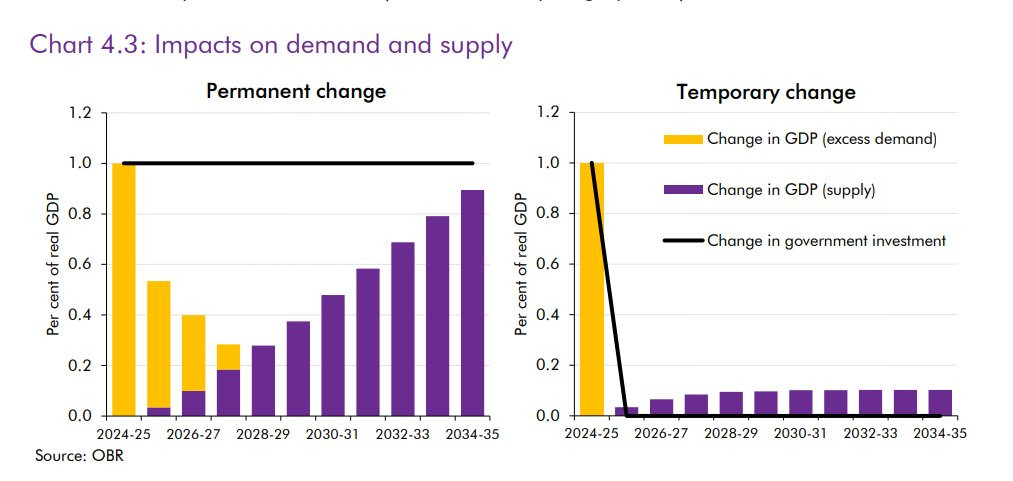6. As govt increases day-to-day spend (e.g. on higher public sector wages), it's fiscal rule to balance the current budget is more likely to bind. This could leave extra space for investment, so long as it meets 2nd fiscal rule to have debt falling in 5th year of forecast

5. Making investments earlier would also mean they could begin to create additional headroom later in the Parliament, and into next. This could help depts when making the case for big capital projects to HMT. Of course taking into account cost of investments themselves
4. Given forecast is rolling 5 years, as we approach next election, the impacts of investing early and reversing previous govt’s cuts would build and could help show the economy is on path to higher growth.
3. This supports case for early investment. OBR say over time investments are fiscally neutral: they pay for themselves by driving growth, which is taxed. In near term, if govt invests £5bn per yr more, they get around £750m per yr back in taxes in 5yrs, by 10 yrs its £1.8bn, increasing over time

2. Equally, the new govt’s planned increases in green investment, and commitment to increase capital spending within fiscal rules, would now help more for meeting its growth mission. But, the largest benefits won’t be until after this parliament.
🪙Few thoughts on what OBR’s important report will mean for govt’s first Budget: 1. Now a much stronger argument for reversing the investment cuts announced by last govt: set to be cut from 2.5% of GDP to 1.75%. This would have a big effect on growth, starting this parliament & rising over time
Could be picking up several things - 1) that many people already think their local public services and infrastructure are overburdened 2) the worry many people have that new housing won’t be coupled with increases in capacity. Govt have tried to get ahead of this with new towns code
Yes - previous polling I’ve seen gave pretty strong support to ‘garden cities’. Name alone could be a big factor in determining appeal. Could also be picking up people’s views on previous new towns. Something for future polls to test
4. There’s also much greater support among Labour and Green voters (42% and 40%) than Conservative or Reform voters (24%) Govt will need to work on the appeal of new towns to voters, inc through their design and what they will mean for affordability and new public services (3/3)
2. A higher % of ppl would prefer govt met housing shortage through expanding existing settlements rather than new towns 3. But looking at breakdowns. Those bearing highest costs of housing crisis are happier to live in new towns - young people (45%) and renters (40%) (2/3)

